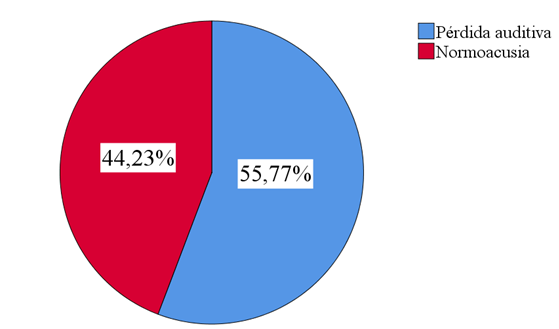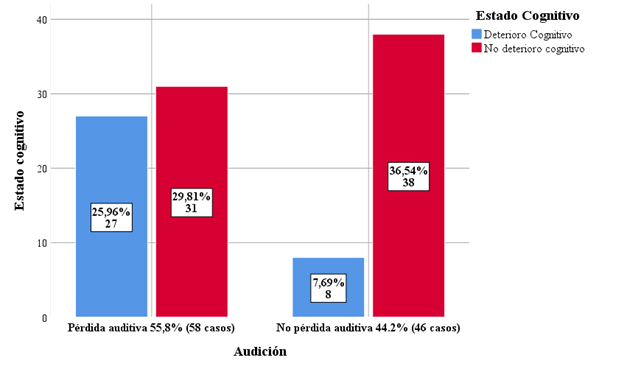ORIGINAL ARTICLE
REVISTA DE LA FACULTAD DE MEDICINA HUMANA 2023 - Universidad Ricardo Palma10.25176/RFMH.v23i4.5740
CORRELATION BETWEEN HEARING LOSS AND COGNITIVE IMPAIRMENT IN THE ELDERLY
CORRELACIÓN ENTRE PÉRDIDA AUDITIVA Y DETERIORO COGNITIVO EN EL ADULTO MAYOR
Félix Cordero Pinedo
 1,a
1,a
Leydy Cordero
 1,b
1,b
Filomeno Jauregui
 1,c
1,c
1 Universidad Nacional Federico Villarreal. Lima, Perú.
a Otorhinolaryngologist.
b Medical Technologist.
c Physician.
ABSTRACT
Introduction: Hearing loss or hearing loss in the elderly is generally caused by degenerative changes typical of aging and can influence the cognitive deterioration of the person, which is manifested by different changes in memory as age increases.
Objective: To determine the relationship between hearing loss and cognitive impairment in the elderly.
Methods: Descriptive, correlational and cross-sectional study. Otoscopy, audiometry and the Pfeiffer questionnaire were performed in 104 adults over 65 years of age, who attended the Otorhinolaryngology service of the Arzobispo Loayza National Hospital. The otoscope, the audiometer and the Pfeiffer questionnaire were used as instruments. Analyzing the relationship using Spearman's Rho correlation coefficient.
Results: Hearing loss was found in 58 cases (55.8%) and normal hearing in 46 cases (44.2%). When applying the Pfeiffer questionnaire to determine cognitive status, an average global score of 8.5 was obtained, determining that values less than 8 are considered mild cognitive impairment. Evidencing mild cognitive impairment in 7% of normoacusics and in 26% of hypoacusics. When performing Spearman's Rho correlation, a high positive correlation was found between hearing loss and cognitive impairment (0.864), significant (0.000<0.05).
Conclusion: There is a high positive relationship between hearing loss and cognitive impairment in the elderly.
Keywords: Hearing loss, hearing loss, presbycusis, cognitive impairment (source: DeCS – NLM)
RESUMEN
Introducción:
La pérdida auditiva o hipoacusia en el adulto mayor se produce, generalmente, por cambios degenerativos propios del envejecimiento y puede influir en el deterioro cognitivo de la persona, que se manifiesta por distintos cambios en la memoria a medida que se incrementa la edad.
Objetivo:
Determinar la relación entre la pérdida auditiva y el deterioro cognitivo en el adulto mayor.
Métodos:
Estudio descriptivo, correlacional y transversal. Se realizó otoscopía, audiometría y se aplicó el cuestionario de Pfeiffer en 104 adultos mayores de 65 años, que acudieron al servicio de Otorrinolaringología del Hospital Nacional Arzobispo Loayza. Se empleó como instrumento el otoscopio, el audiómetro y el cuestionario de Pfeiffer. Se analizó la relación mediante el coeficiente de correlación de Rho de Spearman.
Resultados:
Se encontró pérdida auditiva en 58 casos (55.8%) y normoacusia en 46 (44.2%). Al aplicar el cuestionario de Pfeiffer para determinar el estado cognitivo, se obtuvo una puntuación global promedio de 8.5, determinándose que los valores menores a 8 se consideran como deterioro cognitivo leve. Se evidenció deterioro cognitivo leve en el 7% de normoacúsicos y en el 26% de hipoacúsicos. Al realizar la correlación de Rho de Spearman, se encontró correlación positiva alta entre la pérdida auditiva y deterioro cognitivo (0.864), significativa (0,000<0,05).
Conclusión: Existe relación positiva alta entre la pérdida auditiva y el deterioro cognitivo en el adulto mayor.
Palabras clave: Pérdida auditiva, hipoacusia, presbiacusia, deterioro cognitivo (fuente: DeCS – BIREME)
INTRODUCTION
Hearing loss in older adults is called presbycusis; it occurs due to degenerative changes typical of aging and manifests as sensorineural, symmetrical and bilateral hearing loss. It generally begins at age 60 and affects communication skills, which can lead to isolation and depression. (1,2)
Hearing loss is considered one of the most relevant public health problems due to its impact on older people's physical, emotional and social well-being. (3,4)
Some cases combine presbycusis with cognitive impairment that produces a series of neuropsychological changes, which are usually slow and progressive (5) and influence the communication process. (6)
Presbycusis is the origin of oral communication problems, which, by limiting perceptual-cognitive stimulation in older people with deafness, also becomes a risk factor for cognitive problems. (7,8)
An individual's cognitive function results from the global functioning of perception, attention, visuospatial ability, orientation, memory, language and calculation, some of which suffer a variable degree of deterioration with aging. (9,10)
Older people affected by hearing loss experience difficulties in normally understanding the speech of their interlocutor, especially in noisy environments, in excessively fast speech delivery or with different interlocutors simultaneously. (11-13)
Cognitive impairment also alters the perception and processing of acoustic information transmitted through speech involving thinking, memory, language, judgment, and the ability to learn new things. (14-15)
There are studies in our country about the relationship between older adults and cognitive deterioration, which concluded that cognitive deterioration frequently occurs in hospitalized older adults and is associated with a large number of syndromes and geriatric problems, which gives this condition a complex nature and difficult to manage. (16)
Livia et al. (17) evaluated 210 older adults between 60 and 100 years old, with the aim of identifying the prevalence of cognitive impairment in people of this age group; The Pfeiffer mental state questionnaire and the Folstein Minimental were applied, the prevalence of cognitive impairment with Folstein was 8.6% and with the Pfeiffer questionnaire 6.1%, the concurrent validity between Folstein and Pfeiffer was 0.55 (p=000 ); both instruments measure the same.
At the international level, Valero et al. (18), in their research, reported that when relating the results of tone audiometry and the Mini-Mental State Examination (MMSE), they found a statistically significant relationship between hearing loss and the detected cognitive impairment (r=0.510 r2= 0.238 (p>0.001)) In other words, the scores observed in the samples of people evaluated about cognitive impairment are essentially influenced by hearing loss.
In research conducted in the United States, hearing loss and cognitive decline were studied in 1984 older adults, which concluded that people with hearing loss have a 24% greater risk of cognitive decline. (19)
In another research carried out in Barcelona, the relationship between hearing and cognition was analyzed in 162 older adults, for which an audiometric evaluation and the Pfeiffer questionnaire were applied. It was concluded that the tendency to suspect cognitive impairment increases as hearing loss increases. (20)
The main objective of this research was to determine the relationship between hearing loss and cognitive impairment in older adults. Furthermore, the research is essential because it allows us to determine if hearing loss in older adults influences, in some way, cognitive deterioration in a public hospital center in Lima.
METHODS
Design and study area
A descriptive, correlational, cross-sectional study was carried out in the Otorhinolaryngology service of the Hospital Nacional Arzobispo Loayza, a tertiary public hospital center located in Lima, Peru.
Population and sample
The population was composed of 104 adults over 65 years old who attended the Otorhinolaryngology service of the Hospital Nacional Arzobispo Loayza during the year 2020, and the census sample was made up of 100% of the population. All people had the same characteristics to be considered in this research.
Variables
The independent variable was the hearing loss that manifests itself in the elderly, which consists of symmetrical, bilateral and sensorineural hearing loss, which begins at approximately 60 years of age, first affecting high-pitched sounds and, later, low sounds, which compromise the ability to understand speech and communication skills; This has an impact on the physical, emotional and social well-being of older people. (1 – 4)
The dependent variable was cognitive impairment; Cognitive function is the result of the global functioning of perception, attention, visuospatial ability, orientation, memory, language, and calculation, some of which suffer a variable degree of deterioration with aging. (9,10, 21)
Also, it must be considered that hearing loss in older adults is the origin of oral communication problems that, by limiting perceptual-cognitive stimulation in older people with deafness, also becomes a risk factor of cognitive problems. (22,23)
Instrument
Otoscopy examination, using a Welch Allyn brand otoscope, to rule out the presence of earwax plug, pathology of the tympanic membrane and external auditory canal, liminal tonal audiometry examination, to determine the degrees of hearing, taking into account the criteria established by the Bureau International d`Audio-Phonologie (BIAP), which establishes hearing loss as 20dB or higher, using the Interacoustics brand audiometer (AC40).
Pfeiffer Questionnaire or Short-Portable Mental State Questionaire (SPMSQ): It was used as a cognitive impairment detection tool consisting of 10 questions that fundamentally assess memory and orientation to rule out cognitive impairment, with good sensitivity and specificity rates, whose valuation is the following:
|
Failures |
Patient |
|---|---|
|
0-2 |
No cognitive impairment |
|
3-4 |
With mild cognitive impairment |
|
5-7 |
With moderate cognitive impairment |
|
8-10 |
With severe cognitive impairment |
With previous authorization and permission from the hospital authorities, in addition to the signed informed consent, an otoscopy and audiometry examination were performed, and the Pfeiffer questionnaire was applied to each person who attended the Hospital Nacional Arzobispo Loayza's Audiology unit.
Statistical analysis
The results obtained were analyzed and tabulated for evaluation and statistical analysis, using the SPSS statistical software, version 23; Likewise, inferential statistics were used, using Spearman's Rho correlation coefficient to correlate the variables.
Ethical aspects
The Institutional Research Ethics Committee of the Hospital Nacional Arzobispo Loayza approved the present study. The participation of the people was voluntary with the respective signing of the informed consent. The information obtained was only used by the authors strictly for the purposes of this research.
RESULTS
The results obtained aimed to determine if there is a correlation between hearing loss and mild cognitive impairment in elderly patients. Likewise, correlate these two variables using the Spearman correlation coefficient.
A total of 104 patients were studied, ranging in age from 65 to 90 years. When audiometry was performed, 58 cases were found to have bilateral hearing loss, and 46 cases presented normoacusis (figure 1).
When performing the average hearing threshold at frequencies 500, 1000, 2000, and 4000Hz in the cases that presented hearing loss, greater loss is evident in the high frequencies (2KHz and 4KHz) that correspond to high-pitched tones or sounds (table 1).
Table 1. Average hearing threshold for right and left ear in patients with hearing loss (hypoacusis) according to evaluated frequencies.
|
Ear |
Frequencies |
|||
|---|---|---|---|---|
|
500 Hz |
1 KHz |
2 KHz |
4 KHz |
|
|
Right |
35dB |
36dB |
40dB |
55dB |
|
Left |
34dB |
35dB |
43dB |
59dB |
According to the liminal tone audiometry results and the Pfeiffer questionnaire, the sample was organized into four subgroups according to hearing and cognitive status (Table 2).
Table 2. Hearing status and cognitive status
|
|
Without CI |
With CI |
Total |
|---|---|---|---|
|
Without HL |
38 (36,5%) |
8 (7,7%) |
46 (44,2%) |
|
With HL |
31 (29,8%) |
27 (26%) |
58 (55,8%) |
|
Total |
69 (66,3%) |
35 (33,7%) |
104(100%) |
|
CI: Cognitive Impairment |
|||
When grouping the sample, the hearing status was reflected by 58 cases (55.8%) who presented hearing loss (hypoacusis), and 46 cases (44.2%) did not show hearing loss (normoacusis).
When applying the Pfeiffer questionnaire to determine cognitive status, a global or average score of 8.5 was obtained; Thus, it was determined that values less than 8 show the presence of cognitive impairment.
Of the 46 cases that did not have hearing loss, 8 presented mild cognitive impairment, which represents 7.7%.
Of the 58 cases that had hearing loss, 27 presented mild cognitive impairment, which represents 26% (figure 2).
To determine the correlation that exists between hearing loss and cognitive impairment, we use the Spearman correlation. A high positive correlation was found between both variables: 0.864, with a statistically significant relationship (p < 0.01): table 3.
Table 3. Correlation of variables: hearing loss and cognitive impairment
|
|
|
Hearing loss |
Cognitive impairment |
|---|---|---|---|
|
Hearing loss |
Pearson correlation |
1 |
,864** |
|
Sig. (bilateral) |
,000 |
||
|
N |
58 |
58 |
|
|
Cognitive impairment |
Pearson correlation |
,864** |
1 |
|
Sig. (bilateral) |
,000 |
||
|
N |
58 |
58 |
|
|
(**) The correlation is significant at the 0.01 level (bilateral). |
|||
DISCUSSION
When analyzing the results obtained in the present investigation, the average hearing threshold of the 58 cases (55.8%) with hearing loss was symmetrical and bilateral, which demonstrates that it is characteristic of the hearing loss of aging, as mentioned by Valero et al. (18), Aragón et al. (22) and Pedraza Z and Delgado M. (23)
When analyzing the results of the liminal tone audiometry and the Pfeiffer questionnaire, it was found that 44% of cases did not present hearing loss, of which 7.7% had mild cognitive impairment. This indicates that there is a prevalence of cognitive impairment in older adults, which agrees with the research of Livia et al. (17) by pointing out that in their study, there is a prevalence of cognitive impairment of 8.6% in the Pfeiffer test, while 58 cases (55.8%) presented hearing loss, of which 26% presented mild cognitive impairment. There is evidence of a close relationship between hearing loss and cognitive deterioration in older adults, which agrees with the research by Valero et al. (18) and Lin et al. (19)
In the present investigation, it is evident that of the 46 cases that did not present hearing loss, 7.7% showed cognitive deterioration, while the 58 cases with hearing loss had 26% cognitive deterioration. Hearing loss influences in some way the cognitive decline in the elderly, which has an impact on their personal, family and social environment; This is similar to the research by Estrada et al. (24) and Valero et al. (18)
To determine a relationship between hearing loss and cognitive impairment, inferential analysis has been used using Spearman's correlation coefficient. A value of 0.864 was found, which shows a high positive correlation between both variables; This agrees with the research of Valero et al. (18), Pedraza and Delgado (23).
CONCLUSIONS
There is a high positive relationship between hearing loss and cognitive impairment in older adults who attended the Audiology unit of the Otorhinolaryngology service of the Hospital Nacional Arzobispo Loayza, Lima.
Authorship contributions:
FCP participated in the conceptualization, research, methodology, resources and writing of the original draft. LC participated in the conceptualization, research, methodology, resources and writing of the original draft and FJ, as a member of the research group.
Financing:
Self-financed.
Declaration of conflict of interest:
The authors declare that they have no conflict of interest.
Recevied:
June 26, 2023
Approved:
December 5, 2023
Correspondence author:
Félix Cordero Pinedo.
Address:
Jr. Río Chepén 290 - El Agustino
Phone:
(+51) 990994252
E-mail:
drfelixcordero@hotmail.com
Artículo publicado por la Revista de la Facultad de Medicina Humana de la Universidad Ricardo Palma. Es un articulo de acceso abierto, distribuido bajo los términos de la Licencia Creatvie Commons: Creative Commons Attribution 4.0 International, CC BY 4.0(https://creativecommons.org/licenses/by/1.0/), que permite el uso no comercial, distribucion y reproducción en cualquier medio, siempre que la obra original sea debidamente citada. Para uso comercial, por favor póngase en contacto con revista.medicina@urp.edu.pe.
REFERENCIAS BIBLIOGRÁFICAS


